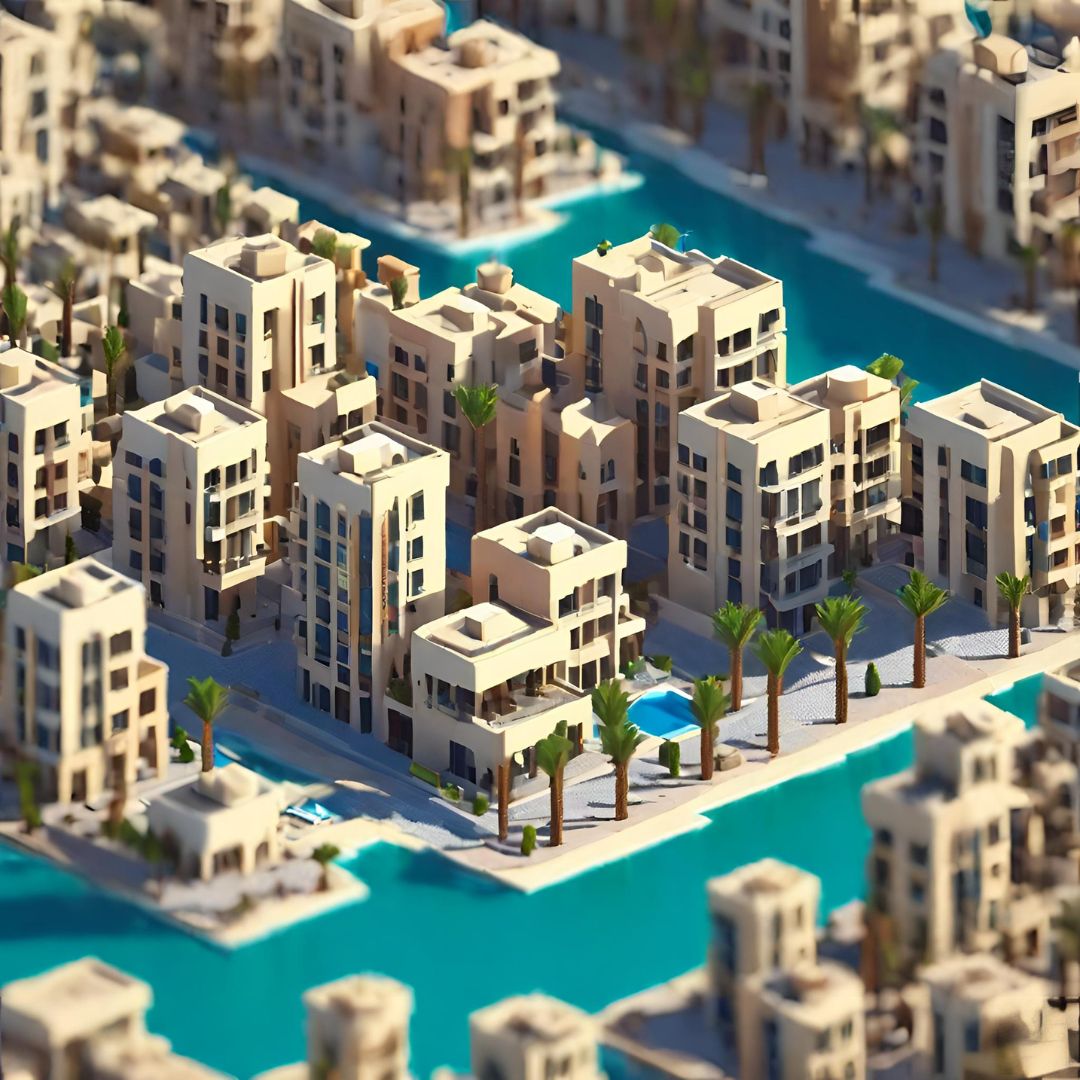Maximizing Rental Income: Choosing Between Short-Term and Long-Term Rental Strategies in Dubai
We often wonder what to do – should we rent short-term, long-term, or even sell our property to make more money? How can we maximize our rental income?
This all depends on your budget first. It also depends on your goals.
In this article, we’ll discuss renting and the differences between short-term and long-term leases.
We look at the pros and cons of short-term and long-term rentals in Dubai. You’ll learn about the potential returns for each leasing option. This helps you navigate the Dubai rental market with confidence. Our focus is on maximizing your rental income. We want to give you, the property owner, the knowledge and guidance to make smart choices for your rental property investments.
Dubai’s Booming Rental Market
Dubai’s rental market has experienced tremendous growth in recent years, making it a lucrative opportunity for landlords. With its thriving economy and increasing population, the demand for rental properties in Dubai is continuously on the rise. This has created a favorable environment for property owners who are looking to generate substantial rental income.
One of the key advantage of being a landlord in Dubai is the high demand for both short and long-term rentals. Dubai is a global business and tourist center. This attracts many different kinds of tenants, like business leaders, foreign workers, and vacationers. Whether you do short or long-term rentals, you can take advantage of Dubai’s busy city.
Dubai has great infrastructure, law enforcement, and many amenities that make it attractive for tenants. The city has residential areas with green spaces and top-notch healthcare facilities to meet the diverse needs of residents and visitors.
We invite you to read the article talking about Dubai’s 2040 Urban Master Plan here ; it tells you more about Dubai’s plans for development in the next few years.
In the following sections, we will delve deeper into the advantages and disadvantages of short-term and long-term rentals in Dubai, comparing their potential return on investment and providing insights to help you make informed decisions as a landlord.
Understanding Short-Term Rentals in Dubai
Short-term rentals, also known as vacation rentals or holiday homes, have become increasingly popular in Dubai’s thriving rental market. These rentals offer flexible accommodation options for tourists, business travelers, and individuals seeking temporary housing solutions. It also offers solution for those who doesn’t have their residence visa yet. In fact, we will talk about it below, but to rent out a property in Dubai for a long term, you need to have your emirates ID and what we call the resident visa.
Instead of staying in a generic hotel, travelers can immerse themselves in residential neighborhoods and feel like a local during their visit. Overall, the demand for short-term rentals in Dubai continues to grow as travelers seek more space, comfort, and value from their accommodations. This trend is likely to continue as the city’s tourism industry evolves to cater to the changing preferences of visitors.
Dubai is a major tourist and business center that draws millions of visitors each year. The city’s famous landmarks, fancy shops, lively culture, and warm welcome make it a popular travel spot. This high demand for short-term rentals creates a profitable market for landlords.
Tourists and business travelers often prefer staying in short-term rentals. These offer more space, privacy, and extra features than hotels. Short-term rentals also let guests experience the local culture and lifestyle, creating a more immersive travel experience.

Benefits of Short-Term Rentals
1. Higher Rental Income: Short-term rentals in Dubai can provide landlords with higher rental income than long-term rentals. Landlords can charge premium rates, especially during peak seasons and events, allowing them to earn more. On average, properties in Dubai are rented for 22 days per month throughout the year. The summer season is becoming more popular. Some people don’t have the choice to take their holidays during the summer and can’t afford to visit Dubai during the high season due to the higher prices.
2. Flexibility for Landlords: Short-term rentals let landlords use their properties when needed. This gives them a balance between personal use and rental income. This flexibility is especially helpful for property owners who also use their units as second homes or vacation spots.
3. Opportunity for Property Appreciation: Dubai’s busy tourism and ongoing development make short-term rentals good for landlords who want their property’s value to increase. There is high demand for short-term rentals, so landlords can see their property’s value grow over time.
Challenges of Short-Term Rentals
1. Higher Operational Costs: Managing short-term rentals often has higher costs than long-term rentals. These costs include utilities, property care, furnishings, and marketing. In Dubai, agencies usually take 17%/18% of the rental income to manage your property. This usually covers marketing, finding tenants, admin, collecting payments, inspections, cleaning, repairs, and ensuring legal compliance.
2. Increased Effort in Property Management: Unlike long-term rentals, short-term rentals need more active property management. If you manage it yourself, you must handle frequent guest arrivals and departures, guest questions, bookings, and guest communication. This extra work may need more resources or a property management service.
Potential Return on Investment (ROI)
The potential ROI for short-term rentals in Dubai can be significant. By charging premium rates, landlords can achieve higher rental income, especially during peak seasons and events. In Dubai, you can expect an average return of 8% to 10% in a “Grade B” location (from Jebel Ali, Production City, JVC to DubaiLand and International City). In a “Grade A” location (around Marina, JBR, JLT, and Business Bay, Downtown, Meydan), you can expect a return of 12% to 14%. These are just price ranges and need to be studied case by case.
It’s important to consider many factors that can impact the return on investment (ROI). These include the property’s location, the building or area’s amenities, the maintenance of the property, the quality of the furnishings, rental rates, occupancy rates, and operating expenses (service charges and replacement costs).
To optimize the return on investment (ROI) of short-term rentals, you can:
- Focus on effective marketing to get more guests consistently.
- Set competitive pricing based on market research and demand
- Maintain the property well to attract and retain high-quality tenants
- Invest in high-quality furniture, facilities, and upkeep. This will lead to good guest reviews and repeat bookings.
- Optimize the rental calendar to maximize occupancy rates
- Streamline the booking and check-in/check-out process
- Leverage technology to automate tasks and improve efficiency
- Ensure compliance with local regulations and tax requirements
- Work with professionals to help them market their property, maintain it, manage the customer experience and service, and help them maximize their investment.
By carefully looking at the benefits, challenges, demand, and potential return on investment of short-term rentals, landlords in Dubai can make smart choices about how to maximize their rental income. It’s best to consider your individual situation, financial targets, and property details before deciding between short-term or long-term rental strategies.
You can ask your agent for help. To book a call with Elodie and get guidance or help, click here.
Exploring Long-Term Rentals in Dubai
Long-term rentals offer numerous advantages and drawbacks in Dubai. Understanding these factors is crucial for making informed decisions and maximizing rental income in the long-term rental market.

Advantages of Long-Term Rentals
1. Stability and Consistent Income: One of the key benefits of long-term rentals is the stability they offer. When you have long-term tenants, you get consistent rental income. You don’t have to constantly look for new tenants. This stability means a steady cash flow. This can be helpful if you want reliable investment returns. In Dubai, long-term contracts are one-year agreements with the tenant. This ensures you get one year’s rent.
2. Reduced Vacancy and Turnover Costs: With long-term rentals, tenants stay for longer periods. This means you can lower costs for advertising, cleaning, and preparing the property for new tenants. In Dubai, agencies take 5% of the rental income to market your property and find a tenant.
3. Potential Rental Increase: In Dubai’s rental market, long-term leases allow you to raise rents over time. As living costs rise, you can adjust rental rates to match market demand. This helps you stay competitive and maximize your rental income.
Drawbacks of Long-Term Rentals
1. Limited Flexibility: Long-term rentals often have leases lasting 1 to 3 years. This means you have less flexibility to change tenants or rental terms. If the market changes or you have difficult tenants, it may take time to solve these issues.
2. Potential Maintenance Costs: While long-term tenants may generally take better care of the property, there is still a risk of maintenance and repair costs. Over time, regular wear and tear can happen, and unexpected repairs may need attention. It’s important to set aside part of your rental income for maintenance costs to keep the property in good shape.
3. Limited Access to the Property: With long-term rentals, you have limited access to your property during the lease. You must respect your tenants’ privacy and rights.
Potential Return on Investment (ROI)
The potential ROI for long-term rentals in Dubai can offer good returns. By charging premium rates and offering quality furniture and amenities, you can achieve higher rental income. In Dubai, you can expect an average return of 6% to 8% in a “Grade B” location (from Jebel Ali, Production City, JVC to DubaiLand and International City). In a “Grade A” location (around Marina, JBR, JLT, and Business Bay, Downtown, Meydan), you can expect a return of 8% to 1o%. These are just price ranges and need to be studied case by case.
In conclusion, long-term rentals in Dubai offer stability, consistent rental income, and reduced turnover costs. However, they come with limited flexibility and potential maintenance expenses. Consider your resources, risk tolerance, and long-term objectives to select the optimal rental strategy for your property.
Rental Property Management Tips
Managing rental properties in Dubai requires careful attention to detail and effective strategies to ensure a smooth and profitable experience. Here are some practical tips for you to consider when it comes to rental property management:
Tenant Screening
Selecting the right tenants is crucial for a successful rental property. Conduct thorough screening to ensure reliable and trustworthy tenants. Key considerations include:
1. Background Checks: Verify potential tenants’ employment history, income stability, and rental references to assess their financial capability and reliability.
2. Credit Checks: Request credit reports to evaluate the tenant’s creditworthiness and payment history. This can help you determine their ability to meet rent obligations on time.
3. Interviews: Conduct interviews to assess prospective tenants’ suitability for your property. Ask relevant questions about their lifestyle and any special requirements they may have.
Property Maintenance
Maintaining your rental property is essential for tenant satisfaction and preserving its value. Consider these tips for property maintenance:
1. Regular Inspections: Schedule periodic inspections to identify any maintenance or repair needs. Promptly address issues such as plumbing, electrical, or structural problems to prevent further damage.
2. Responsive Communication: Establish open lines of communication with tenants to address maintenance requests promptly. Maintain a reliable system for tenants to report issues and ensure they feel heard.
3. Landscaping and Curb Appeal: Maintain a tidy and attractive exterior to create a favorable impression for potential tenants. Regularly mow lawns, trim hedges, and address any landscaping needs.
Rent Collection
Efficient rent collection is vital for maintaining a consistent rental income. Implement these practices to streamline the process:
1. Clear Rental Policies: Clearly outline rent payment expectations, due dates, and acceptable payment methods in the lease agreement. Ensure tenants are aware of any penalties for late payments.
2. Automated Systems: Consider offering online payment options to simplify rent collection and improve convenience for tenants. Automated reminders for due dates can help ensure timely payments.
3. Consistent Follow-Up: Monitor rent payment patterns and promptly follow up on any late payments. Communication and enforcement of late payment policies can help maintain on-time rent payments.
In conclusion, effective rental property management in Dubai involves diligent tenant screening, proactive property maintenance, and streamlined rent collection processes. Remember, staying organized, responsive, and proactive is key to successful property management in Dubai.
To avoid you all those questions and admin tasks, working with an agency will make the rental of your property much easier for you.
For more details about rentals, contact Elodie here.
Conclusion: Making an Informed Decision
Ultimately, there is no one-size-fits-all answer. Each landlord must carefully consider their objectives and weigh the pros and cons of short-term and long-term rentals. By understanding the advantages and disadvantages of each approach, assessing market conditions, and aligning with the needs of potential tenants, landlords can make an informed decision that aligns with their goals for maximizing rental income in Dubai.
Remember, the rental market is dynamic, and periodic reassessment of your strategy based on market changes and tenant preferences is essential. By staying informed and adapting your approach, or getting professional help, you can navigate the Dubai rental market successfully and achieve optimal results from your investment property.





